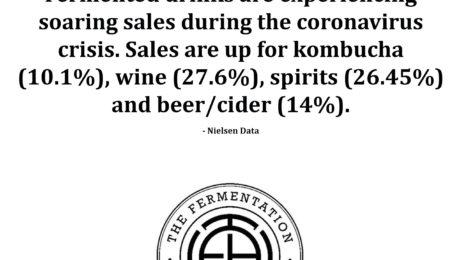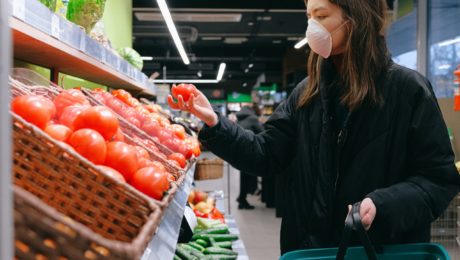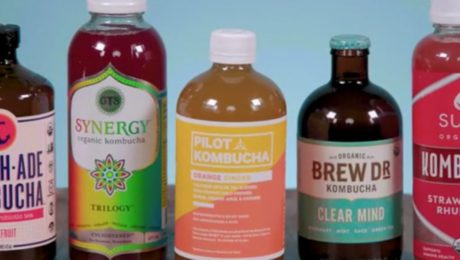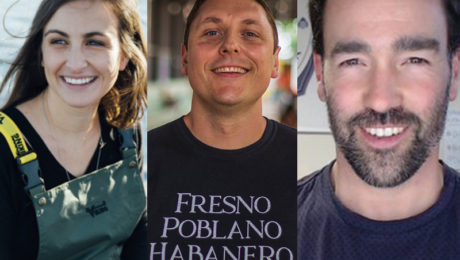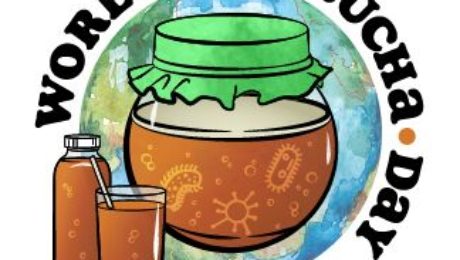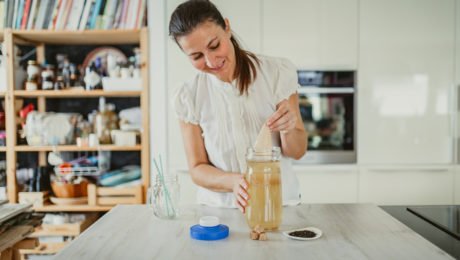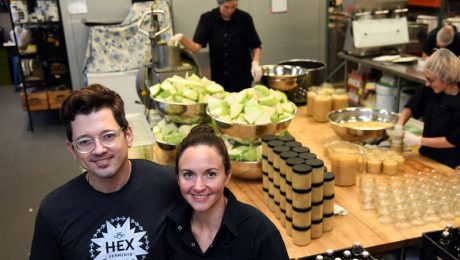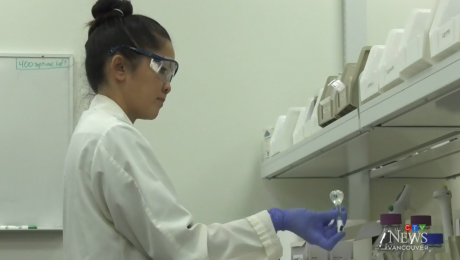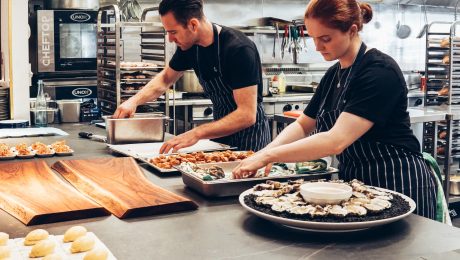Sales of Fermented Drinks Soar During Coronavirus
Fermented drinks are experiencing soaring sales during the coronavirus crisis. Sales are up for kombucha (10.1%), wine (27.6%), spirits (26.45%) and beer/cider (14%). (Nielsen Data)
- Published in Business
Fermentation Booms During Pandemic
In a matter of days, the novel coronavirus outbreak dramatically changed grocery shopping. Empty grocery store shelves have become a ubiquitous symbol globally of home quarantine.
Sales exploded for pantry staples like dried beans (62.9%), powdered milk (126.3%) and rice (57.5%). But another grocery quarantine must-have item is emerging – fermented food and drink. Sales are up for kombucha (10.1%), natto is selling out in Japan, yogurt is selling out in Europe and pickle and sauerkraut sales in Russia are up 79%. Fermentation brands are reporting some of their biggest sales during the month of March, as much of the nation was forced into self-isolation to prevent the spread of COVID-19.
“For fermented food, it’s an interesting time. We’re an immune boosting type of food, so our sales are skyrocketing. We’ve had the best month we’ve ever had in business,” says Drew Anderson, CEO of Cleveland Kitchen and TFA board member. Cleveland Kitchen makes sauerkraut and fermented dressings and marinades. “It is bittersweet. Obviously, we want this virus to go away. But we’re seeing the fermentation industry as a whole, the one benefit is it’s driving a lot of trial. People say ‘I heard fermented food is supposed to be good for you, I’m cooking more, why not grab a pack of kraut.’”
Though sales are high, brands are changing their operation model. Rather than running two shifts of processing at Cleveland Kitchen, they’re down to one. Employees must take daily temperature readings before work, stop for mandatory handwashing breaks and use new Purell hand sanitizing stations.
“Sales are up overall, but we have had to implement our emergency sanitation protocols to continue production,” says Meg Chamberlain, CEO of Fermenti, LLC. The North Carolina-based brand sells a variety of vegetable ferments, teaches fermenting workshops and hosts annual the annual WNC Fermenting Festival. Their staff is under voluntary home quarantine – which means staff only goes from work to home. “Overall our company is proving resilient and we are hopeful to continue to provide Fermenti to our community.”
Because food production is considered essential business, licensed fermentation companies have not been forced to stop working during the coronavirus outbreak.
Aneta Lundquist, CEO of 221 B.C. Kombucha, has been posting videos to her Instagram stories of the Florida based kombucha processing facility. Lundquist says employees are working overtime to deliver orders.
“Our orders during the global pandemic have spiked. Consumers have gone full blown ‘healthy’ food during this health crisis,” she says. “Now is the time to make a switch from over-processed and denaturalized pseudo foods to real, natural and unprocessed foods that nourish our body, mind and spirit and help building a strong immunity.”
Lundquist adds customers need to “think of kombucha, kimchi, sauerkraut and other fermented fruits and vegetables as microbiome rock stars!…Always choose wildly fermented foods.”
“Remember it is about diversity and the quality of microorganisms, not just quantity. You can only achieve this by fermenting traditionally.”
Keenan Smith, CEO of Goodwolf Kefir in Portland, agrees. He says: “The probiotic and fermented space will increase as people have an increase in health awareness and want a better functioning immune system.” They are home delivering their kefir, and donating a
Brands are getting creative with their marketing, too. Goodwolf Kefir is home delivering kefir to the Portland area and donating a proceed of sales to their local food bank. Cultured South and Golda Kombucha have setup a pick-up fridge at their Atlanta location where customers can prepay for an order online, get a secret code to unlock the fridge and grab fermented food and drinks. Wild Kombucha in Baltimore is offering free, local, “no human touch” home delivery for their 12 pack bottles. 28 Mile Vodka & Distillery in Illinois have converted their distillery to make hand sanitizer that they call “Fool’s Gin.” The CEOs of Miyoko’s Creamery and Lifeway Kefir are both using the brands Instagram accounts to share recipes using their product.
Outside the U.S., though, different government rules are restricting fermentation brands from operating during the global outbreak. In India, Mountain Bee Kombucha has halted operations during a 21-day lockdown.
“There is no question that our business is impacted immensely, one for the fact that we are still quite small-scale which supplies directly to a handful of local grocery stores. Currently those grocery stores have been working at limited capacity and/or temporarily shut,” said founder and head brewer Honey Islam. “Another reason for lesser business in these times is due to the lack of awareness in the Indian market about fermented foods, especially kombucha. We are engaged in educating our customers as well as spreading awareness in the community via workshops, classes, 101 sessions, pop-ups, all these channels are education are currently disrupted which stalled our efforts in bringing kombucha awareness to the masses.”
Mountain Bee Kombucha is focusing on educating through Instagram videos and YouTube tutorials.
- Published in Business
How Kombucha Became a Tea Empire
CNBC “Suddenly Obsessed” explores how kombucha went from a niche beverage to a massive fermented drink category reaching $500 million in sales. Once only popular among hardcore health enthusiasts, CNBC notes kombucha’s appeal is because of a growing consumer preference for healthier drinks. Bigger brands are entering the kombucha space, though, manipulating the brewing process. Pepsi Co. acquired Kevita kombucha, for example, and now Kevita pasteurizes their kombucha for a longer shelf life.
Read more (CNBC)
- Published in Business
Bubbling Over: Is Fermentation More Than a Fad
We asked three fermentation experts if recent popularity of fermented foods is a fading trend or a new food movement. These industry professionals weigh in on their predictions for fermentation’s future. The fermenters include: Bri Warner (CEO of Atlantic Sea Farms, a commercially viable seaweed farm that makes kelp kraut and kimchi), Nicholas Gregory (owner of Pulp Hot Sauce, an Atlanta-based fermented condiment brand), Joshua Rood (co-founder and CEO Dr Hops Kombucha beer, a health-conscious alcohol).
Do you think the surge of fermented food and drinks is a trend will disappear or a new food movement here to stay?
Bri Warner, CEO Atlantic Sea Farms: “Now that we have a robust understanding of how good gut health effects overall health, I think fermentation is here to stay. I do think the category will continue to innovate to remain relevant, with a stronger focus on quality ingredients that are good for people, planet, and, in our case, oceans!”
Nicholas Gregory, owner Pulp Hot Sauce: “I think the current fermented food movement is here to stay. We are at an intersection of technology, science and health further than we have ever seen in human history. The internet, television, several seminal books and air travel have given us unprecedented exposure and access to information. This exposure and access to food and world cultures is more in depth than ever before. Including the food history and traditions of those cultures. Combine that awareness with a relatively intelligent and sophisticated medical system; an understanding of healthy lifestyles, a willingness to make healthy decisions, an understanding of the benefits of a healthy gut biome and how it all correlates to a longer, happier, healthier life. Along with a craving for umami and fermented funky flavors for a growing number of the population. I believe we are in the middle of a movement that shows no signs of slowing down or going away anytime soon. In fact, I see it only becoming more popular, more normal, more accepted, more diverse, more creative and more exciting in the decades to come.”
Joshua Rood, co-founder and CEO Dr Hops Kombucha beer: “As co-founder and CEO of Dr Hops Kombucha Beer, I appreciate that there is currently a powerful trend towards living, fermented foods. But answering the question of whether or not that will continue is repugnant. We here at Dr Hops are driving that trend! We are not playing the game of hoping that it will simply continue. We are committing ourselves, each day, to the life-enhancing awesomeness of fresh, authentic, fermented foods and beverages. Please join us in that! Join us in leading the health-conscious food and beverage revolution!”
- Published in Business
“This is the Decade When Kombucha Becomes a Household Name”
Kombucha has its first international holiday. On February 21, kombucha brewers and consumers around the world will celebrate World Kombucha Day.
Kombucha dates back over 2,000 years to 221 B.C. The fermented tea is one of the fastest growing beverages in the world. Kombucha is estimated to reach $3.5 billion in international sales by 2025, with one third of that in U.S. sales. Hannah Crum, founder and president of Kombucha Brewers International (KBI), a non-profit trade association (and an affiliate of TFA), believes 2020 will be the decade kombucha becomes mainstream.
Educating the public, though, is the key step to making kombucha a recognized wellness drink. KBI began the World Kombucha Day initiative and is encouraging brands to host events, offer free tastings and partner with retails for in-store promotions.
Since KBI started six years ago, Crum has watched the small kombucha labels that joined KBI transform into big brands. She sees the kombucha industry growing not with big kombucha labels but with small craft brands. If consumers in small towns all over the world start purchasing kombucha, local producers will need to drive that growth, Crum adds.
“And it opens the door for all these other fermented products to come in,” Crum adds. “Drinking vinegar, shrubs, water kefir, even sauerkraut and fermented vegetables. Local brands will drive the entire fermented food and drink category.”
Below, a Q&A with Crum on World Kombucha Day and how kombucha can maintain their growth momentum.
Question: Why a World Kombucha Day?
Hannah Crum: Kombucha’s mythological origins hearken back to 221 BC in China. The Chinese are famous for their quest for longevity with their elixirs. It’s been part of the story of kombucha, this mythological origin. So 221, at least in the American system, translates to February 21st. What better year to launch it than in 2020.
Why World Kombucha Day? To celebrate the culture of kombucha. Obviously drinking a commercial brand is how I first heard about kombucha. It’s how most people first experience kombucha, even though home brewing has been around for a long time. It’s a way for people to raise awareness about kombucha, to be excited about what it is, to honor its Asian roots, and to really help more people know about kombucha.
This is the decade when kombucha becomes a household name. Launching this world kombucha day in 2020, in this decade, is that first step towards building excitement around kombucha. Not just the drink being trendy, because i think it’s going to last longer than a trend. It’s getting more people to wake up to how wonderful this product is.
We think of kombucha as a gateway. Kombucha isn’t an end point. We don’t stop at kombucha, we start with kombucha. From kombucha, people move to other products in the fermentation association, now it’s sauerkraut and kimchi and kvas and water kefir. I don’t even think we could see this many water kefir brands starting to emerge if kombucha didn’t exist.
Q: Tell me the process of making World Kombucha Day an official “day.”
HC: The process is pretty straight forward and basically just means coming up with the day and promoting it. We have applied to some of the calendars and apparently if you pay enough money, you can even make it onto the National Holiday Calendar.
Q: What are you hoping brands will do to celebrate World Kombucha Day?
HC: I’m hoping they’ll elevate kombucha into the consciousness. That can be providing education, and education could come in the form of free samples or offering a promo at your favorite store. It’s on a Friday this year — if you happen to be at a farmers market or you happen to have a tap room, why not host an education event.
Really it’s this opportunity to engage with your community, do this outreach and to help people understand what kombucha is. Because so many people still either haven’t heard the word, they don’t know what it is, they’re afraid of it, they’ve tried it and think its weird, whatever it is, just giving them another touch point, another opportunity to hear about it, another opportunity to try it without having to pay $3-5 per bottle in order to see what it’s like.
People can add events to our World Kombucha Day calendar based on region. This is free, open to all kombucha producers, not just KBI members. While World Kombucha Day is a KBI initiative, it’s really about the category of kombucha.
Q: Tell me more about KBI origins. Why did you create KBI ?
HC: It started with our business, Kombucha Kamp, and our mission: changing the world, one gut at a time.
KBI also comes from looking at our culture which works in symbiosis. We’ve always understood we can’t do this alone, we have to do this in partnership, we have to be in community. Changing the gut one world at a time, knowing we can’t do it alone, and how do most people find out about kombucha? Again it’s through a commercial product.
In 2010, we had that incident where Whole Foods took all the kombucha off of store shelves and it really creates a lot of fear. It’s a trauma point that we’ve continued to have to work through together. That is what inspired us to come together and really make this work.
We know: people don’t really understand what kombucha is. When you don’t know about something, you’re afraid of it. People worry “I’m going to get bad bacteria in my brew and harm myself.” Well, that’s highly unlikely, just like any fermented food. The only reason they still exist today is because they’ve always been so incredibly safe to make and pass around or they would have been on the compost heap of history ages ago.
So knowing that there was a need, we have a unique roll. We’ve already been doing some cross-category marketing. We did a 30-day kombucha challenge, we did a New Years re-evolution, which were all designed to raise awareness about the category.
So I nominated myself to head KBI and Alex (Crum’s husband), God love him, supported me. We started with KKon (KombuchaKon) in 2014, and here we are about to have our 7th annual show, our 5th annual trade show. We’ve grown from 40 members to over 300. We’ve always been international though, which is unique. We’ve always had people from around the world participating with us.
Q: Is the U.S. leading the growing kombucha popularity?
HC: Yes. America leads the world because this is where the commercial industry started. GT’s is going to celebrate his 25th anniversary this year. Kombucha has been a commercially available product for 25 years. Even now its taken this long, right, even in the early years it wasn’t around until 2010 when it started to pick up steam and we started to see more brands proliferate. Now here in 2020, we’re going to make it a household name.
Just like yogurt wasn’t a household staple, it was something hippies had to make at home on their countertops themselves, then it was turned into a multi-billion dollar industry. And that’s exactly what we see kombucha becoming. What we see isn’t the opportunity for a bunch of processed food companies. Rather its a bunch of small, family-owned businesses that serve local communities with a fresh product. That’s what’s different and unique about all the fermentation businesses.
I love Farmhouse Cultures — I just bought a bottle of their kraut juice — I look on the back and they’re adding vinegar to it. You can’t keep up when you’re a massive brand and you’re going to have to take shortcuts. To me, yes it tastes good, but its not kraut juice, its vinegar and kraut juice. Unfortunately, that’s just what happens when you go too big with certain things.
People in the 21st Century are looking for viable opportunities with a job that makes you feel good about the work you’re doing and that helps your local communities, and it’s important for these communities to have access to really fresh, nutrient-dense foods. So I always advise people: there’s an opportunity, as long as you’re not afraid of hard work. I advise people its a labor of love, emphasis on the labor. But I also think that if you’re someone who wants to be in your community doing good, this is a great way to do it.
Q: Do you think that’s how the kombucha industry is going to grow — more small producers than large?
HC: Exactly right. There’s always going to be a certain number of large producers and brands that want to pursue that type of dream, but it’s a huge trade off. Sure you might end up with a bigger paycheck in the end, but you also give up so much of your life and energy in order to make it profitable.
You’re never going to have another GT’s Kombucha. He was first to market. That was a rare opportunity. Were not likely to see an individually or privately owned brand get to that type of level unless they have investment and if you take on an investment, now you are beholden to other people’s ideas about your business.
Look at the beer industry and how things have happened there. New Belgium just sold to a major food corporation from Asia because even economies of scale aren’t sustainable if you don’t continue to have capital infusions. So if you’re looking for a model that will stay sustainable over time, I think it is staying small, having a local footprint, and again that’s better for the planet, better for the community. The reason products need super long shelf lives on them is because it’s being shipped massive distances. If you only have to go to your local place to get kombucha fresh, you don’t have to put so much processing into your products.
Q: Tell me what you’re seeing in the industry now — are craft beer brewers entering the market? Bigger commercial soda brands?
HC: All of these entrants, it’s exciting. What they are seeing are dollar signs and opportunities. Especially as they see their sales slipping. It’s true for craft beer as it is for soda.
That’s just reflecting how consumers are changing their tastes over time. It’s always healthy to diversify. The reality is what we would love — Coca-Cola started as a health drink, selling in pharmacies, with actual essences and things that were good for you. And now it’s turned into a fake version of a real thing, full of fake ingredients. How wonderful would it be for us as an industry, for us to bring them back to the good side. Don’t poison people with your cheap products and aspartame and things that are known to be toxins. Let’s try to make this something that brings about positive change to everybody.
We love beer too! I think what we’ll also start to see is the benefits of unfiltered beer. I personally believe that pasteurization and these processing steps that remove the yeast or all of the living nutrients from beer basically creates products that don’t deliver on the nutritional promise that was guaranteed for our ancestors.
We crave bubbles because our ancestors understood that meant that nutrients were present in a living form. And so many people have come to find they can’t tolerate carbonated water — well that’s carbonic acid, it’s not natural organic acids, it’s not all of the yeast and nutrients present in yeast.
The conflict is always these are tough products to control. That’s again where the model of having several small producers is actually better.
Q: What are some of the greatest myths consumers believe about kombucha? How can brands debunk the myths?
HC: In the headlines, we get the two polarizing viewpoints — kombucha is the miracle elixir that will save your life and kombucha is snake oil that is dangerous. The reality is the truth is always somewhere in the middle. This is not a beverage for everybody. That’s because we have so many people dealing with a healing crisis. However, there is a ferment for everyone. So either its a miracle cure — or it will kill you. Both of those are the greatest myths.
Will you feel a benefit from drinking kombucha? Absolutely. We have a research study we presented last year showing how kombucha impacts inflammation and stress markers. They’ve taken that study to the next step, which we’ll be hearing those results at KKon this year.
People have provided anecdotal information for how kombucha has helped them with a wide range of inclement for hundreds, thousands of years, right. And so often science wants to ignore that information. But truly that’s the jumping off point for studying something, for understanding something. It is because of the anecdotal information.
Science is a method of inquiry. The phenomenon already exists. We just don’t necessarily know what’s driving it until we engage in scientific inquiry. So this idea that science is settled, that we already know everything, is ridiculous. It’s human hubris to think that. What I think is exciting is in this 21st Century, we continue to do the research and validate the anecdotal claims, and again not everything is for everybody. Some people are allergic to shrimp, strawberries, you name it, there are people who can be allergic to anything and all that says is we’re diverse and not everything is for everybody and that’s OK. Honestly, I think what’s exciting about our industry is you try one kombucha and don’t like it — try another. It’s going to taste totally different. It’s not a miracle, but it’s not going to kill you. It’s not for everyone, but it helps a lot of people. And that’s what World Kombucha Day tries to do — to introduce you to kombucha and see where you land on that spectrum.
Q: What is driving kombucha’s popularity in the past few years?
HC: Microbiome. The rise of autoimmune disease and metabolic disease. People are sick of being sick and start to turn to food to get better because they’ve heard you can get better with certain types of food or by changing their diet. And while they are not getting that advice from their doctors, unless they’re seeing a naturopath or something like that, I think people out of desperation are turning to their diet because they’re just so uncomfortable with where they’re at healthwise. That to me is truly what’s fueling the fueling popularity of this product. So many people consume it, and they say they “Just feel good.” What does that mean, how do you quantify that? Is it just my tummy feels more settled? There’s a whole range of things that could refer to. And I think that’s really what’s driving it.
People are waking up. They realize now they’ve been lied to by packaged foods — I call it poisoned in prepackaging by pretty people. How many sodas is Beyonce drinking to be that shape? You know there’s mythology when they’ve put these packages in people’s hands but that’s not who’s actually drinking this on a regular basis.
Especially this younger generation is more critical of advertising and more critical of doing what everyone else has done until now. They are starting to recognize “Hey what are all these weird flavorings and chemicals in my food and water?” and “Hey I thought someone was in charge of and managing this?” and then you find out, no, corporations are actually still allowed to dump toxins into the water supply, we still have lead in Michigan and Flint. This mythology of a government that cares for you is being broken down. For good reason. Unfortunately, the forces that be are trying to maintain a status quo because they make money off people being sick for so long. But that really is that change — I’m not saying kombucha will cure everything. Buts it’s a gateway. It’s a gateway to healing your body, getting some kind of relief, and seeing there’s a world of other choices you can make that are going to yield different health benefits.
Q: The soda industry is rapidly declining. Do you think kombucha can capture those consumers?
HC: One thousand percent. Really Who is our competition? It’s not other kombucha brands. Its soda companies, it’s energy drink companies, it’s soda water companies, it’s seltzer water companies, it’s “smart water” that’s water with some electrolytes, it’s Gatorade. It’s all this manufactured, lab-created junk. Supplements will never be as good as the real thing. And kombucha is a real thing — it’s a real fermented beverage. It’s what soda aspires to be.
- Published in Science
“Overfermentation” — What is it and is it a Problem?
By: KEFIRKO
Overfermentation is a phenomenon which is a result of fermentation that lasted too long or had too much culture in it. Read on to get more insight on it and some tips on how to avoid it.
Time is Important!
Usually overfermentation happens when we leave the culture to ferment longer than recommended. For milk kefir that means more than 24 hours and for water 48 hours. With kombucha things are a bit more complicated, since there are very different approaches on how long it should ferment, depending on the individual taste. In our opinion, to make kombucha a great tasting beverage, it’s best to ferment it for 7-10 days.
So, if you exceed the recommended time of fermentation, it’s quite possible your culture will overferment. How will you know if this happened? By the look and taste of it.
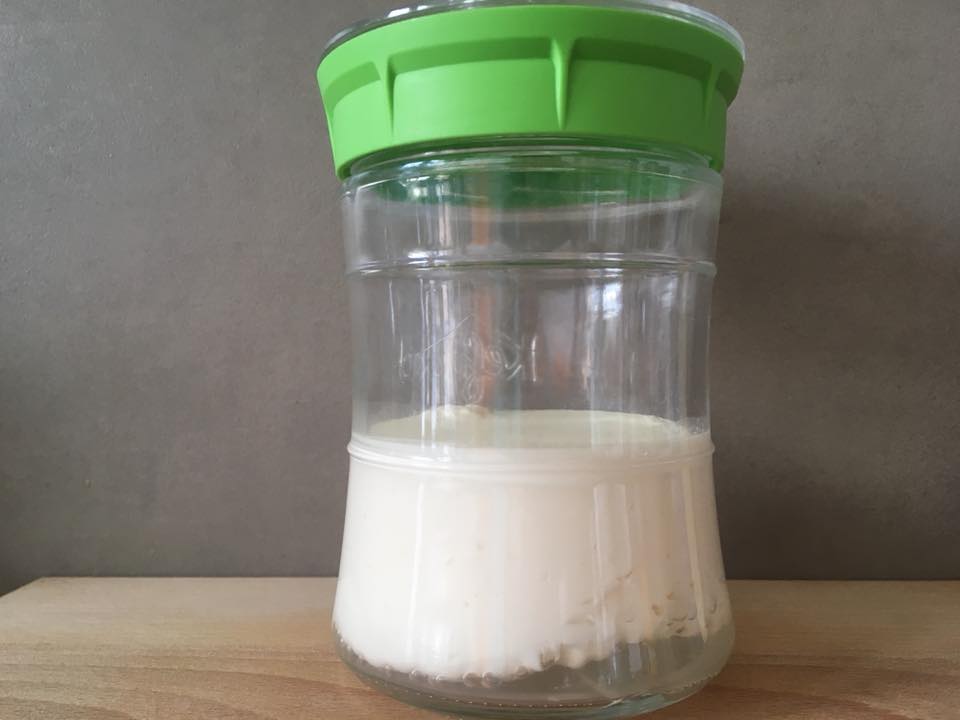
The liquid that separates form thicker kefir is whey. It is rich with proteins.
Overfermented Kefir is More Potent
Just by the look you are able to see if overfermentation is happening in your milk kefir. It will become more curdled and you will see separation happening. The liquid whey will separate from more thicker kefir. Additional fermenting time will also change the taste, it will become more sour.
Water kefir will not change much in appearance. When water kefir is finished, it tastes a bit sweet still. If you prefer it more sour you can overferment it. If you leave it for a very long time it may become even to sour to drink.
The same is with kombucha. After long fermentation, it becomes more sour, even vinegar-like in taste. If you overferment kombucha you will also notice it becomes a bit more cloudy.
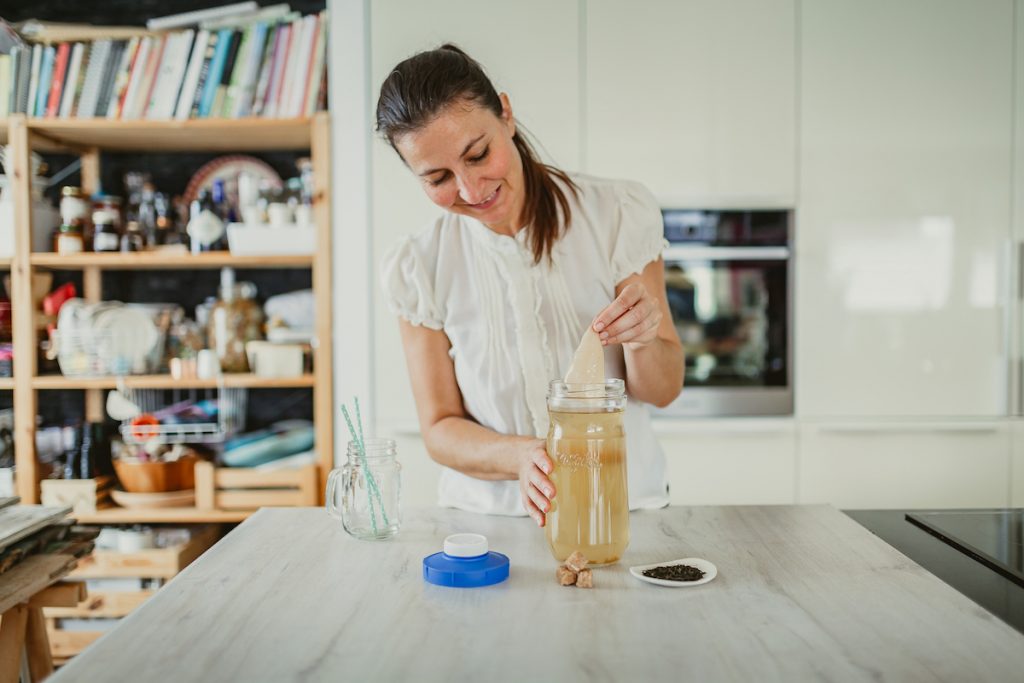
If you like more sour kombucha just leave it to ferment longer, more than a week.
Why This Happens?
We already mentioned one important factor that leads to overfermentation – time. If you leave the culture in milk/water/tea too long, it will overferment.
This is also connected to temperature of the environment. Higher temperature accelerates the activity of the microorganisms in the ferment. You will notice that in warmer seasons or if you have very warm interior in cold season, the fermentation can be finished even in half time.
Too much culture for the amount of milk/water/tea you are using. If you have more microorganisms in the ferment it’s only logical they will need more food. If you keep the volume of your ferment the same all the time, but the cultures multiply, the ratio will change noticeably. Again the fermentation will be ready faster. Note, it’s not recommended to overcrowd the grains, take away extras regularly. This will ensure activity and well-being of your cultures.
What to do When You Overferment?
If this was not intentional, you probably will not like the taste of kefir or kombucha once it’s overfermented. Here are some ideas what to do with it:
MILK KEFIR
If it’s only slightly separated and you still like the taste, you can just stir it well then strain and use as always. But if the kefir is very curdled and dense, you will probably need a big colander, where you can gently stir the kefir and separate the grains.
If you don’t like the taste of overfermented kefir you can use it in smoothies or as ingredient in other dishes and baking recipes (pancakes with whey, brioche, muffins).
WATER KEFIR
You can’t do much to change the taste of water kefir once it gets too sour. You can add sugar or other sweeteners. But maybe using it in smoothies or even for baking, would be better idea (ciabatta).
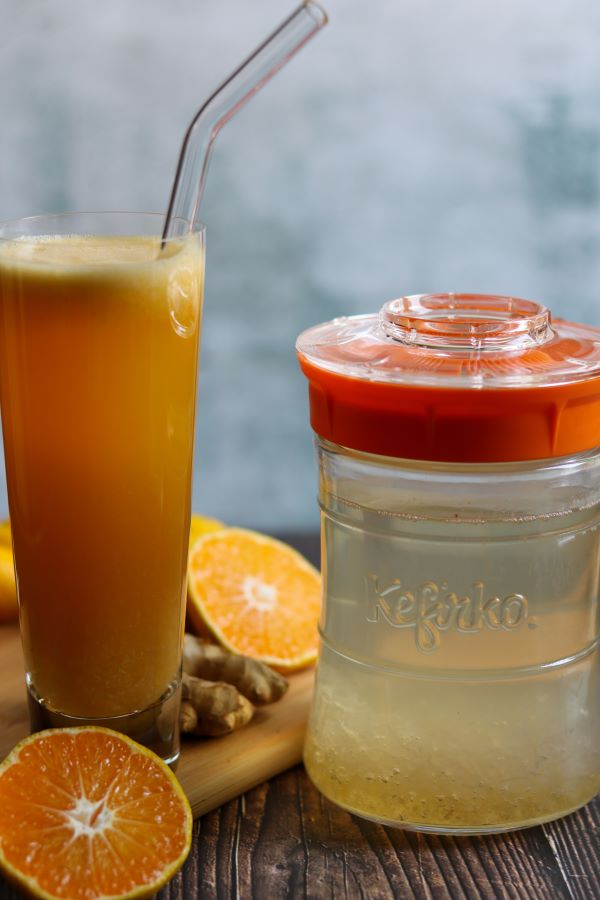
Water kefir gets more opaque if you ferment it for too long.
KOMBUCHA
The same as with water kefir, you can use the sour kombucha in the smoothies or other refreshing drinks.
You can also leave it to ferment even longer until it gets really sour and then use it as a kombucha vinegar. This means fermenting it a few weeks not just days longer. Some also use this very sour kombucha as a natural cleaning product.
IS OVERFERMENTATION PROBLEMATIC?
Overfermentation basically happens when the grains don’t have enough food, the content of sugar has disappeared. Once all the food is gone the cultures starve. If this happens very often it can pose a threat for the cultures and they may stop growing and multiplying or producing fermented beverage. With fermentation, it’s important to feed the cultures regularly and this ensures having them for a lifetime.
KEFIRKO is a company that designs products for fermentation enthusiasts making their own kefir at home. They make glass jars with specialty lids for making a kefir drink and kefir cheese. KEFIRKO launched their product on Kickstarter 6 years ago, an idea “born from noticing how kefir preparation at home can be quite messy and complicated. Not something most of us would gladly do every day.”
- Published in Business
Sauerkraut Growing Thanksgiving Tradition
Americans with German and Eastern European descent make sauerkraut part of their Thanksgiving tradition. The Baltimore Sun highlights Baltimore-based Hex Ferments that produces a few tons of sauerkraut a month, in multiple varieties. Sales are going so well (Hex Ferments makes kombucha and kimchi, too) that they’ll be expanding to a bigger production facility in 2020. Hex Ferments cofounder Meaghan Carpenter said: “I think sauerkraut can save the world.”
Read more (The Baltimore Sun)
- Published in Food & Flavor
How Alcoholic is Kombucha?
Researchers are studying kombucha to determine whether kombucha brands are unintentionally selling the fermented tea with a high alcohol content. The study, by the British Columbia Center for Disease Control, is testing hundreds of kombucha samples sold at grocery stores and farmers markets for ethanol levels. The fermentation process makes all alcohol slightly alcoholic, but in the U.S. the drink has to be sold below 0.5% to be sold as a non-alcoholic beverage. In Canada the amount is higher, at 1.1%. Researchers are looking at how different control factors affect kombucha’s alcohol content, like how cold refrigeration temperature, where it’s stored in the fridge, how it’s made and type of tea and flavors used.
Read more (CTV News)
- Published in Science
New Food Laws Taking Effect in 2020
Thousands of new state laws were passed across America this year, and dozens affect fermentation businesses — small and large — as well as home fermenters.
Government agencies are loosening some strict health code and alcohol regulations, laws that made running an artisanal business difficult. There are also new opportunities being created that allow craft breweries to expand their operations, such as entertainment districts where beer can be sold and enjoyed legally.
Read on for the breakdown of 2019 food laws passed in each state
Alaska
SB16 — Expands state alcohol licenses to include recreational areas. After the Alaska Alcoholic Beverage Control Board began cracking down on alcohol licenses in 2017, several recreational sites were denied licenses to sell alcohol. The bill, known as “Save the Alaska State Fair Act,” now expands license types to the state fair, ski areas, bowling alleys and tourist operations.
Arizona
HB2178 — Removes red tape for small ice cream stores and other milk product businesses to manufacture and sell dairy products. The bill, called the “Ice Cream Freedom Act,” allows smaller mom and pop businesses to make milk-based products without complying with state regulations designed for large dairy manufacturers.
Arkansas
HB1407 — Prohibits false labeling on agricultural products edible by humans. That includes misleading labels, like labeling agricultural products as a different kind of food or omitting required label information.
HB1556 — Ends the “undisclosed and ongoing investigations” of the Alcoholic Beverage Control Board, the Alcoholic Beverage Control Division, and the Alcoholic Beverage Enforcement Division.
HB1590 — Limits the number off-premise sales of wine and liquor in the state to one permit for every 7,500 residents in the county or subdivision. Small farm wines are the exception to the new law.
HB1852 — Allows a microbrewery to operate in a dry county as a private club, without approval from the local governing body.
HB1853 — Amends the Local Food, Farms, and Jobs Acts to increase the amount of local farm and food products purchased by government agencies (like state parks and schools).
SB348 — Establishes a Hard Cider Manufacturing Permit. Cider brewers can apply for the annual $250 permit, authorizing the sale of hard cider. Producers may not sell more than 15,000 barrels of hard cider a year.
SB492 — Establishes temporary or permanent entertainment areas in wet counties where alcohol can be carried and consumed on the public streets and sidewalks.
California
AB205 — Revises the definition of beer to mean that beer may be produced using “honey, fruit, fruit juice, fruit concentrate, herbs, spices, and other food materials, and adjuncts in fermentation.”
AB377 — A follow-up to the state’s landmark California Homemade Food Act in 2018, the new bill would clarify the implementation process of last year’s bill. The California Home Food Act made it legal for home cooks to operate home-based food production facilities. The law, though, was only enacted if a county’s board of supervisors voted to opt-in to offer the permits. Only one county in California has opted in (Riverside). County health officials are avoiding singing on the bill because of potential food safety risks.
AB619 — Permits temporary food vendors at events to serve customers in reusable containers rather than disposable servingware. The “Bring Your Own Bill” also clarifies existing health code, allowing customers to bring their own reusable containers to restaurants for take-out.
AB792 — Establishes a minimum level of recycled content (50%) in plastic beverage bottles by 2035. The world’s strongest recycling requirement, the law would help reduce litter and boost demand for manufacturers to use recycled plastic materials.
AB1532 — Adds instructions on the elements of major food allergens and safe handling food practices to all food handler training courses.
Connecticut
HB5004 — Raises minimum wage to $15 by 2023.
HB6249 — Charges 10 cents for single-use plastic bags by 2021.
HB7424 — Raises sales tax from 6.35% to 7.35% for restaurant meals and prepared foods sold elsewhere, like in a grocery store. Also repeals the $250 biennial business entity tax.
Delaware
HB130 — Bans single-use plastic bags by 2021.
SB105 — Raises minimum wage to $15 by 2024.
HB125 — Facilitates growth and expansion of craft alcoholic beverage companies, raising amount of manufactured beer to 6 million barrels.
Florida
SB82 — Prohibits a municipality from regulating vegetable gardens on residential properties.
Idaho
HB134 — Regulates where beer and wine can be served, now including public plazas.
HB151 — Charges licensing fees for temporary food establishments based on the number of days open. Fees will gradually increase through 2022.
Illinois
HB3018 — Amends Food Handling Regulation Enforcement Act, requiring a restaurant prominently display signage indicating a guest’s food allergies must be communicated to the restaurant.
HB3440 — Allows customers to provide their own take-home containers when purchasing bulk items from grocery stores and other retailers.
HB2675 — An update to state liquor laws, the bill removes hurdles for craft distilleries to operate. Craft distilleries would be allowed to more widely distribute their products themselves, rather than distributing under the state’s three-tier liquor distribution system that separates producers, distributors and retailers.
SB1240 — Imposes a 7 cent tax on each plastic bag at checkout, with 2 cents staying with the retailers. The remaining 5 cents per bag would fix a statewide budget deficit.
Indiana
HB1518 — Creates a special alcohol permit for the Bottleworks District. The $300 million, 12-acre urban mixed-use development in the Coca-Cola building will serve as a culinary and entertainment hub in downtown Indianapolis.
Iowa
SF618 — Increases the limit on alcohol in beer from 5% to 6.25%.
SF323 — Canned cocktail and premixed drinks served in a metal can, up to 14% alcohol by volume, will now be regulated like beer.
Kentucky
HB311 — Requires proper labeling of cell-cultured meat products that are lab produced.
HB468 — Expands defined items permitted for sale by home-based processors.
Louisiana
HR251 — Designates week of September 23-29 as Louisiana Craft Brewer Week.
SB152 — Establishes definition for agriculture products. Prohibits anyone from mislabeling a meat edible to humans.
SR20 — Designates week of September 3-9th as Louisiana Craft Spirits Week.
Maine
LD289 — Prohibits stores from selling or distributing any disposable food containers that are made entirely or partially of polystyrene foam (Styrofoam).
LD454 — Provides funding and staffing needed to give local students and nutrition directors the resources needed to purchase and serve locally grown foods.
LD1433 — Bans two toxic, industrial chemicals (phthalates and PFAS) from food packaging. Maine becomes first state in the nation to ban the two chemicals.
LD1532 — Bans all single-use plastic bags in the state. Law will be enacted by April 2020, at which time shoppers can pay 5 cents for a plastic bag. Maine is the fourth state to pass a ban, joining California, New York and Hawaii.
LD1761 — Increases amount of barrels craft beer and hard cider manufacturers can produce in a year. The cap increased from 50,000 gallons to 930,000 gallons (approximately 30,000) barrels. The law also makes it easier for a small brewery to get out of a contract with a large distributor.
Maryland
SB596 — Defined mead as a beer for tax purposes.
HB1010 — Updates state beer laws by increasing taproom sales, production capabilities, self-distribution limits and hours of operation. Known as the Brewery Modernization Act, the law is aimed to create jobs and increase economic impact.
HB1080 — No restrictive franchise law provisions for brewers that produce 20,000 barrels a year or less.
HB1301 — Sales tax will be collected on Maryland buyers from online sellers, helping small businesses compete with online retailers.
Massachusetts
HB4111 — Raises minimum wage by 75 cents a year until it reaches $15 in 2023.
Michigan
HB4959 — Gives state Liquor Control Commission the power to seize beer, wine, mixed spirit and mixed wine drinks, in order to inspect for compliance with the state’s extraordinarily detailed and complex “liquor control” regulatory and license regime. Bill also repeals a one-year residency requirement imposed on applicants for a liquor wholesaler license, after the U.S. Supreme Court invalidated a similar Tennessee law as a violation of the U.S. Constitution’s commerce clause.
HB4961 — Prohibit licensed liquor manufacturers from requiring licensed wholesalers to give the manufacturer records related to the distribution of different brands, employee compensation or business operations that are not directly related to the distribution of the maker’s brands.
SB0320 — Eliminates mandate that businesses with a liquor license must post a regulatory compliance bond with the state.
Minnesota
HF1733 — Updates the state’s omnibus agriculture policy law, including: create a custom-exempt food handlers license for those handling products not for sale; extend the state’s Organic Advisory Task Force by five years; allow the agriculture department to waive farm milk storage limits is the case of hardship, emergency, or natural disaster, and modify milk/dairy labelling requirements; modify labelling for cheese made with unpasteurized milk; expand the agriculture department’s power to restrict food movement after an emergency declaration; modify eligibility and educational requirements for beginning farmer loans and tax credits.
Mississippi
SB2922 — Prohibits labeling non-meat products as meat, like animal cultures, plants and insects.
Montana
HB84 — Changes tax on wine to 27 cents per liter, and a tax on hard cider at 3.7 cents per liter.
SB358 — Raises alcohol license fee for resorts from $20,000 to $100,000 each.
Nebraska
LR13 — Establish and enforce definitions for plant-based milk and dairy. Proper product labeling would be enforced for milk and dairy food products that are “truthful, not misleading, and sufficient to different non-dairy derived beverages and food products.”
Nevada
SB345 — Authorizing pubs and certain wineries to transfer certain malt beverages and wine in bulk to an estate distillery; authorizing a wholesale dealer of liquor to make such a transfer; authorizing an estate distillery to receive malt beverages and wine in bulk for the purpose of distillation and blending; revising when certain spirits that are received or transferred in bulk are subject to taxation.
New Hampshire
HB598 — Establish a commission to study beer, wine, and liquor tourism in New Hampshire. The commission will specifically develop a plan for tourism, including establishing tourist liquor trails with signage along the highway, suggest changes to liquor laws that would enhance tourist experiences at state wineries, breweries and liquor manufacturers and suggest how to allow a “farm to table” dinner featuring New Hampshire produced food items and local alcoholic beverages.
HB642 — Defining ciders with alcohol content greater than 6% (but no more than 12%) as specialty beers.
New Jersey
A15 — Raises the state minimum wage to $15 an hour by 2024, raising in $1 increments every year.
SB1057 — Establishes a loan program for capital expenses for vineyards and wineries in New Jersey.
New Mexico
SB149 — Change name of Alcohol and Gaming commission to Alcoholic Beverage Control Division.
SB413 — Allows breweries to: sell beer at 11 a.m. on Sundays; have private celebration permits for events like weddings and graduation parties; no minimum standards (50 barrels a year or 50 percent of all sales coming from beer brewed on site) for businesses to hold a small brewer license; eliminate excise tax, with breweries paying $.08 per gallon on the first 30,000 barrels produced.
New York
AB6019 — Encourage expansion of fresh fruits and vegetables in community gardens.
AB 8419 — Enacts the farm laborers fair labor practices act, granting collective bargaining rights, workers’ compensation and unemployment benefits to farm laborers
SB578 — New option for any brewer or distiller to file their taxes electronically.
SB1263 — Allows mead (honey-based wine) and braggot brewers to apply for a state farm meadery license. Similar to a farm winery, brewery, distillery and hard cider license, the law recognizes the boom in the craft beverage industry in the state. As a licensed meadery, mead-makers who use 100% New York honey will quality for additional benefits: offer onsite tastings, sell products by glass in their tasting rooms, sell takeout packages, offer other New York farm-produced beer, wine, cider and spirits.
SB3281 — Amends current Alcoholic Beverage Control law, authorizing the sale of cider, mead, braggot and wine at games of chance.
SB4812 — Amend current Alcoholic Beverage Control law, permitting New York State Fair concessionaires to issue a temporary State Liquor license to sell alcoholic beverages on the state fairgrounds.
SB5675 — Amend current Alcoholic Beverage Control law, authorizing issue of liquor license to a business located within 200 feet of a religious institution in multiple counties.
North Carolina
HB363 — Adds a third tier to the craft beer system — mid-level brewers. Now brewers can self-distribute 50,000 barrels of product. Called North Carolina’s Craft Beer Distribution & Modernization Act, the law also expands liquor licensing to college-level NCAA events, where drinking is currently unregulated. Currently, the law only applies to beer and wine.
North Dakota
HB1190 — Amend code to allow a winery to be issued a license without the previous requirements for how much wine is allowed to be produced in a year.
HB2079 — Amends code regarding pasteurized milk, authorizing a state milk sanitation rating and sampling surveillance officer for the rating and certification of milk and dairy products.
SB2343 — Adds microbrew pub as an official brewer licensee under city code. A microbrew pub may manufacture on the licensed premises, store, transport, sell to wholesale malt beverage licensees, and export no more than 10,000 barrels of malt beverages annually; sell malt beverages manufactured on the licensed premises; and sell alcoholic beverages regardless of source to consumers for consumption on the microbrew pub’s licensed premises. A microbrew pub may not engage in any wholesaling activities.
Oklahoma
SB544 — Requires limits on licensing fees for businesses who only sell at farmers markets.
SB608 — Requires manufacturers of the top 25 wine and spirit brands to sell their products to any state-licensed wholesaler. The law requires equal sales of the top brands, potentially creating a competitive market. The matter is currently being heard by the Supreme Court, as some businesses believe this eliminates a free market.
Oregon
HB3239 — Removes the limit of how many on-premises sales licenses that a distillery can have.
SB247 — Adds containers for kombucha and hard seltzer to the types of beverage containers covered by Oregon’s Bottle Bill. The Bottle Bill establishes laws that require stores and distributors to accept certain empty beverage containers and pay a 10-cent refund value for each container.
Pennsylvania
HB947 — Amends the Liquor Code established in 1951, to provide further definitions for licenses and regulations for liquor, alcohol and malt and brewed beverages.
Rhode Island
SB620 — Increases the amount of malt beverages that could be sold on premises at a craft brewery.
South Dakota
SB68 — Prohibits labeling cell-cultured protein as meat.
SB124 — Allows a retailer, carrying their own merchandise purchased from a wholesaler, to transport alcoholic beverages to the retailer’s licensed business.
Tennessee
SB358 — Requiring unpasteurized butter sold to the public must bear a warning on the package label. The warning was approved by the legislature and added to state code.
SB 1082 — Allows premises authorized to serve wine to also serve high alcohol content beer. Requires training for applicants for server permits, consisting of no less than 3.5 hours of alcohol awareness training. Clarifies premises authorized to sell alcoholic beverages to include tables and chairs outside the front wall of the licensee’s building.
Texas
HB1545 — Allows craft breweries to sell beer to-go in Texas. Though wineries have been able to sell to customers for years, breweries have been unable because of alcohol beverage code written in 1935.
HB4542 — Adds brewpub to local tax code for businesses involved in manufacturing and distribution of alcoholic beverages.
SB572 — Expands state cottage food law to include opportunities for people to make low-risk products in home kitchens and sell them to consumers. Cottage food products now include fermented products, pickled vegetables, acidified canned goods and frozen fruits and vegetables.
Utah
HB33 — Defines the term “produce” as a food that is: fruit, vegetable, mix of intact fruits and vegetables, mushroom, sprout from any seed source, peanut tree nut, or herb and a raw agricultural commodity. Known as the Utah Wholesome Food Act, the law also expands the definition of “food establishment” to include farms.
HB453 — Defines specific business that can have a recreational beer license, specifically banning karaoke bars and ax-throwing businesses from getting a license.
SB132 — Drops 3.2% beer in favor of 4% brew, allowing the stronger beers to be sold in grocery and convenience stores. Stronger beers would still be sold in liquor stores operated by the Utah Department of Alcoholic Beverage Control.
Vermont
SB113 — Bans single-use plastic bags on July 1, 2020 and requires a fee of at least 10 cents for paper bags. Bans polystyrene foam contains, plastic stirrers and plastic straws.
Virginia
HB1960 — Allows distillers to product and market low alcohol volume products.
HB2634 — Makes every “dry” county in the state a “wet” county. Allows sale of mixed beverages by licensed restaurants (and the Board of Directors of the Virginia Alcoholic Beverage Control Authority) by any municipality. If the county, town or district holds a referendum and the majority vote prohibits alcohol sales, then alcohol sales are banned in that jurisdiction.
- Published in Business
Will Kombucha Become Next Beer or Sparkling Water?
Natalie Jenkins of Motherlode Kombucha aims to make kombucha the next beer or sparkling water. “It’s just something as common as that, and it’s not weird, and it’s not a health drink, and it’s not only hippies who drink it or only women who drink it.” Jenkins shares with WCPO Cincinnati the struggles of starting a business. A longtime kombucha drinker, Jenkins launched her own kombucha company after realizing her town of Covington, Kentucky was void of a local kombucha brand or taproom. With help from SCORE, an organization that mentors future small business owners, Jenkins launched her business this year and brews from Covington’s Kickstart Kitchen. The photographer knew little about starting a business. She said: “The biggest challenge is connecting to an audience that I know is there but I haven’t met yet. I always feel like I’m selling my soul a little bit when people say, ‘What are the health benefits of kombucha?’ Well, it’s got probiotics. It’s good for you. But it’s not why I drink it. I think it’s delicious. It’s more about having community and having something to gather around.”
Read more (WCPO Cincinnati)
- Published in Business

